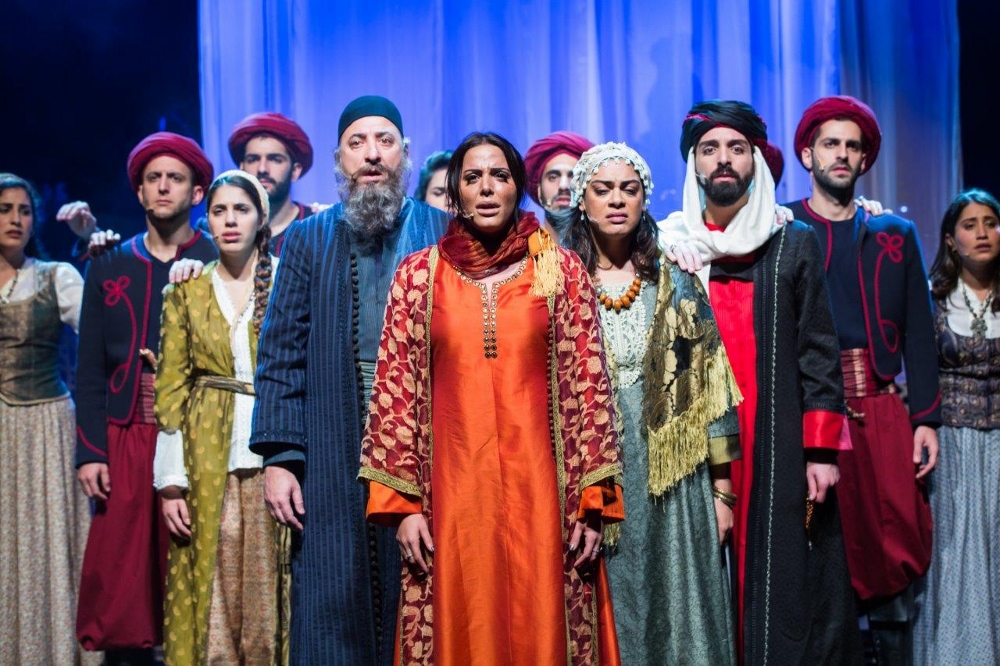
Solika, an original musical by Maor Sabag and Tair Sibony, directed by Rafi Niv, is a vibrant swirl of bright colors, songs and stirring emotions. Despite the tragic quality of Solika’s story, the tone and underlying message is an uplifting one, celebrating understanding, love, and friendship. It is a very timely and welcome pleasure to find such an excellent production, marked by strong performances, that draws on the history and culture of Jewish life in Morocco.
Many legends have been spun around the true-life events of Solika Hajuel, a Jewish girl executed in Tangier in 1834, when she was just 17 years old. The Jewish, Christian, and Moslem traditions all venerate her memory and tell her tale, in different variations. The version chosen by Sabag and Sibony is one of forbidden love, and fidelity to one’s beliefs. Yet the emphasis of this production is on the relationships between Jews and Moslems as neighbors and friends; and the tragedy that can result when one allows the differences, rather than shared humanity, to determine choices. Although the story is a simple one, with an almost fairytale quality (albeit tragic), its message has a very contemporary feel.
The story is told almost entirely in song – and the songs are wonderful, performed with a live orchestra onstage. Solika is portrayed by Reut Cami Alush, who endows the character with grace and beauty, as well as the very relatable curiosity and yearning for love experienced by young people of every era and nationality. Her desire for independence and fun leads to struggles with her mother Simha (Adi Zorea), a widow raising her daughter in the home of her brother Rabbi Mimon (Uri Zaguri), Solika’s uncle, who guides the girl in her studies. Although ultimately, Solika’s tragic end results from the rift between Jews and Moslems, this is depicted as a result of politics and the manipulative schemes of the power-hungry Habib (Yakir Eliahu Vaknin) the royal consultant. Among the people however, relationships are depicted as neighborly and friendly. The talented singer Nasrin Kadri reveals her acting talents as the warm and charismatic Hura, a Moslem woman who is a close friend to Solika’s mother. Sol, as she is called by family and friends, has two good friends Rachell (Sapir Manor) and Iman (Esti Asraf). Esti Asraf in particular, brings an endearing vivacious charm to her performance. One is Jewish and one is Moslem, yet this is never of consequence in their friendship. When love arrives in the form of the handsome Prince Amir (Ala Dakka), that is when the difficult questions arise. Due to the serious nature of the plot, parents who plan to bring their children to a performance should consider discussing the story and its implications before attending.
The set design (Ruth Miller) and costumes (Judith Aharon) evoke the beauty of the local culture in vibrant colors, flowing fabrics, beautiful lamps and Moroccan wood lattice screens. The sights, sounds, scents, and flavor of the place and time are expressed in movement as well as song, with lively scenes of women washing clothes and the bustle of the marketplace. The heart of the play may be found in Nasrin Kadri’s moving and powerful performance of the song “We are brothers.”
Solika
Play inspired by the true story of Solika Hajuel
By Maor Sabag and Tair Sibony
Director: Rafi Niv; Composer and Musical Supervisor: Maor Sabag; Lyricist: Tair Sibony; Dialogues and Dramaturgy: Shahar Pinkas; Stage Design: Ruth Miller; Lighting Design: Amir Castro; Costume Design: Judith Aharon; Choreography: Tula Damari; Orchestrations: Matan Yona; Sound Design: Nir Rave Biderman





